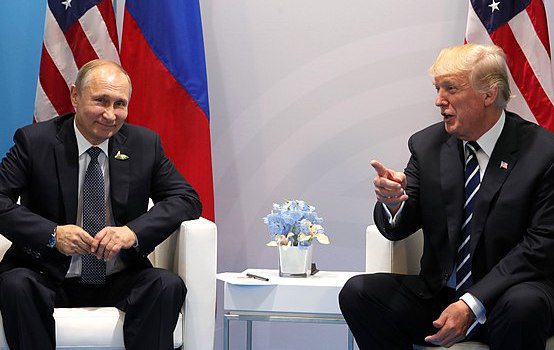The Helsinki Debacle and U.S.-Russian Relations
By • July 16, 2018

Vladimir Putin and Donald Trump meet at the 2017 G-20 Hamburg Summit. Credit: Creative Commons/www.kremlin.ru.
As Rod Dreher noted earlier today, the Helsinki summit ended with an embarrassing performance from Trump:
President Trump stood next to President Vladimir V. Putin of Russia on Monday and publicly challenged the conclusion of his own intelligence agencies that Moscow interfered in the 2016 presidential election, wrapping up what he called a “deeply productive” summit meeting with an extraordinary show of trust for a leader accused of attacking American democracy.“They said they think it’s Russia; I have President Putin, he just said it’s not Russia,” Mr. Trump said, only moments after the Russian president conceded that he had favored Mr. Trump in the election because of his promises of warmer relations with Moscow.“I will say this: I don’t see any reason why it would be” Russia that was responsible for the election hacking, Mr. Trump added. “I have great confidence in my intelligence people, but I will tell you that President Putin was extremely strong and powerful in his denial today.”
Trump’s behavior at the summit press conference was pitiful and obsequious. There is being diplomatic, and then there is indulging another government in its self-serving lies for no good reason. Trump’s display today was the latter. The political backlash against the president has been predictably swift and intense, and it guarantees that any rapprochement with Moscow will face even more resistance than before. No one should be angrier with Trump’s embarrassing spectacle than serious advocates of engagement with Russia.
To make matters worse, Trump is returning once again from a high-profile summit with nothing to show for the effort. For all of Trump’s shameless pandering, the summit appears to have achieved nothing at all. The summit provided an opportunity to extend New START to the mutual benefit of both countries, but that opportunity was squandered. Trump is bringing discredit on the very idea of engagement with Russia, and at the same time the U.S. gains nothing from his substance-free approach to diplomacy.
I have long been an advocate for constructive engagement with Moscow, and I supported the so-called “reset” in Obama’s first term. The “reset” was limited but successful in advancing common interests on a handful of issues. It also succeeded in reducing tensions that had risen to dangerous levels in the closing years of Bush’s presidency. U.S.-Russian relations are once again at a very dangerous low point, and the negative reaction to the summit promises to drive them even lower. We need a policy of competent and constructive engagement more than ever, but this president was never going to be able to provide that.
Improving the relationship with Moscow has been and continues to be a worthwhile goal, but Trump has made it politically impossible to pursue that goal in the near term. The U.S. and Russia could and should have a more constructive relationship, but it can’t be based on the denial of reality and ignoring the genuine disagreements that exist between our governments. If there is to be genuine improvement in U.S.-Russian relations, it will come from facing up to these disagreements and finding a way to work through or around them.

0 Comments:
Post a Comment
Subscribe to Post Comments [Atom]
<< Home